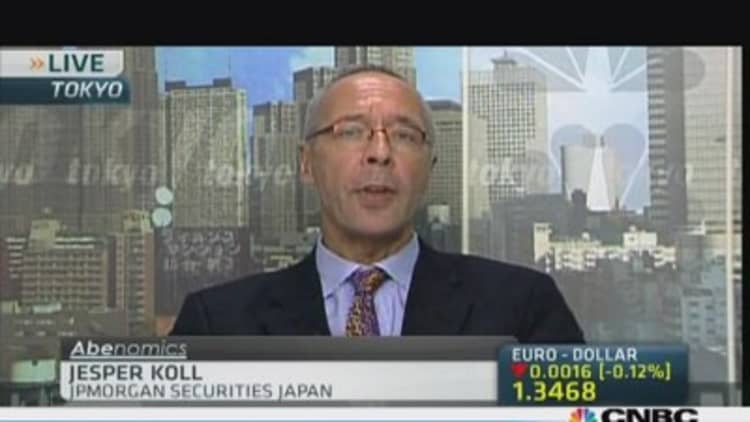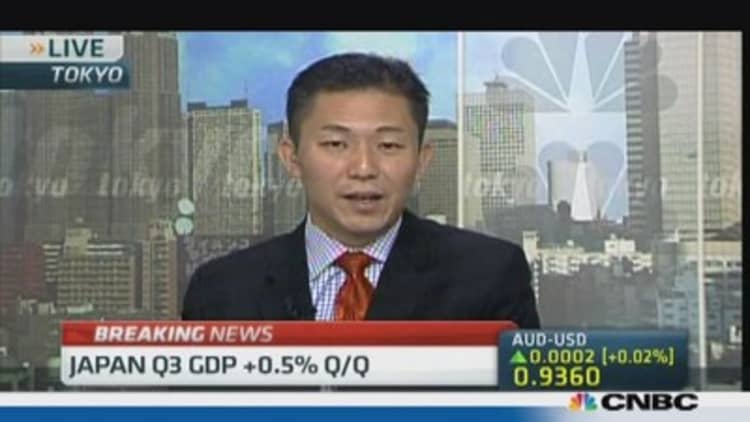Japan's Nikkei climbed to a six-month high on Friday, breaking decisively above the 15,000 level on renewed yen weakness amid expectations that U.S. monetary policy will remain easy.
Expectations U.S. monetary stimulus will stay in place for some time were fueled by dovish comments this week from Federal Reserve Vice Chairman Janet Yellen, who is undergoing a confirmation hearing to take over the top spot at the central bank from Ben Bernanke.
The Nikkei 225 index climbed 2 percent to close at 15,165.92, its highest level since May, totting up a 7.7 percent gain for the week. As the U.S. dollar pushed over the key 100 yen level to trade as high as 100.30 yen, a two-month high, the Nikkei pushed out of a range it has been stuck in recently.
(Read more: Markets soothed by Yellen, watching data)

A weaker yen typically boosts Japanese stocks as it is viewed as positive for exporters' earnings and makes the country's products more competitively priced overseas.
Analysts say expectations that Fed tapering is likely to come later rather than sooner should help keep the yen weak and bolster the Nikkei heading into year-end.
(Read more: Are the stars re-aligning for dollar-yen?)
"Yellen is sending in the message that she's not so much interested in tapering U.S. monetary policy for the moment. It seems that U.S. interest rates will stay around this level, meaning the market will be stable for the time being," said Yuuki Sakurai, CEO of Fukoku Capital Management.
"Although we don't see a very strong sign of Japan's economy booming, I think people started to realize there are very few negative factors for the Japan economy at the moment," he added.
Even if the Fed tapers its asset purchases, it might be viewed as a positive for the Japan market, analysts said.
(Read more: Is 'Abenomics' good for Japan's economy?)
"There's strong fundamentals," said Greg Gibbs, senior foreign-exchange strategist at RBS, citing a narrowing current account surplus, rising inflation and the Bank of Japan's quantitative easing measures.

"There's the possibility the market is looking forward to tapering in the U.S., however uncertain that may be. (Tapering) argues for further weakness in the yen over the medium term. There are reasons for the dollar-yen to go up," he added.
Weak yen, strong Nikkei
Japan's Finance Minister Taro Aso was on Thursday quoted as saying that it was important to keep currency intervention as a policy option to prevent one-sided moves.
(Watch now: Japan official: Economy needscorporate tax cuts)
Analysts said the remarks may also be contributing to yen weakness, and the Nikkei's bounce.
"Such words should do little more than help investors feel confident that Japan would prevent a deep fall in dollar-yen, perhaps as far as below 95. But at some level it may help encourage investors to increase their exposure to short yen positions," Gibbs said in separate note.
The Nikkei, the best performing major stock market globally so far this year, may also be getting a boost from expectations that an economic recovery may stick this time.
(Watch now: Mizuho sees signsof comeback in Japan economy)
"Given the depreciation of the yen and an economic recovery, companies are likely to run down their savings for use in forward-looking activity (capex and employment). Corporate savings are set to fall further, thus accelerating the domestic demand recovery and the easing of deflation," Societe Generale said in a report published earlier this week.
"Total leverage is growing," it said. "As total leverage expands further, the yen is likely to depreciate further on the back of a steady U.S. recovery," Societe Generale added. "The Japanese economy has just entered a virtuous economic cycle for the first time in more than a decade."
— By CNBC's Leslie Shaffer. Follow her on Twitter: @LeslieShaffer1

